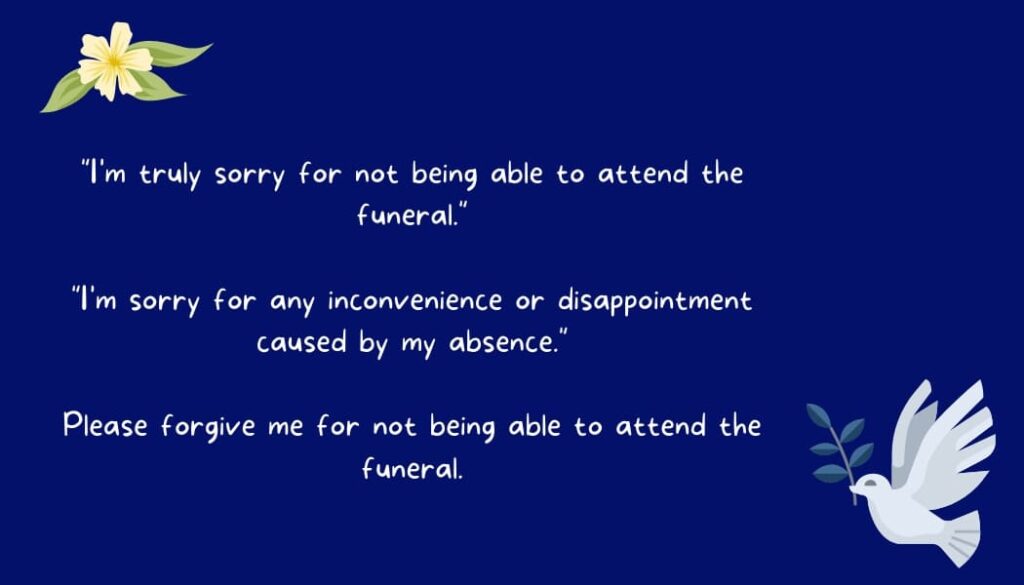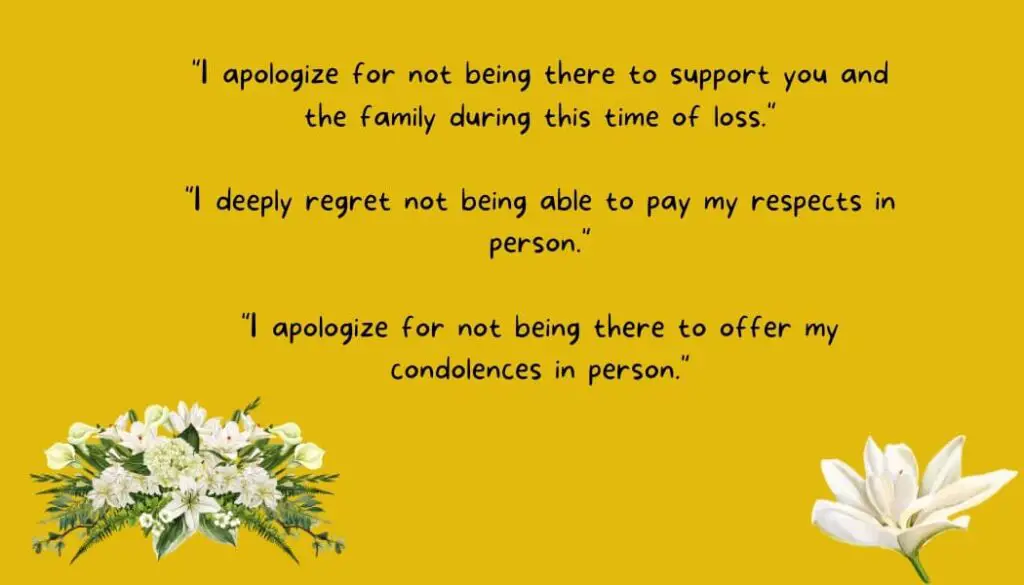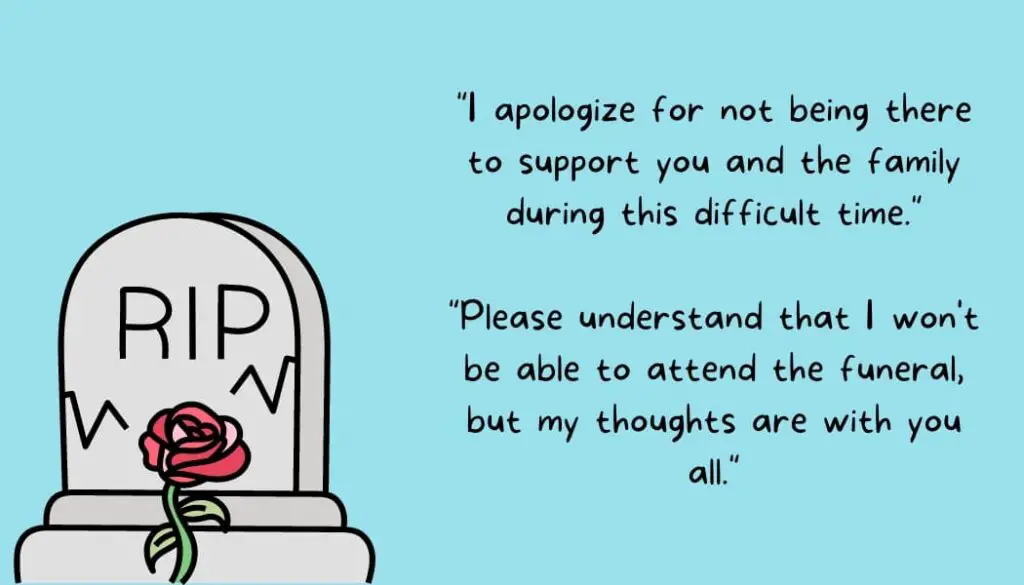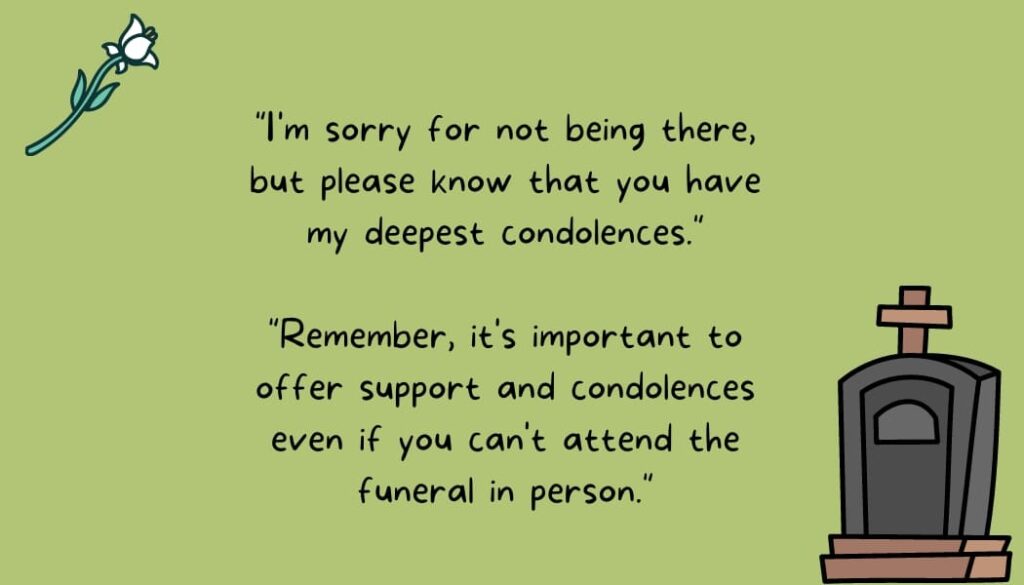To respectfully decline a funeral invitation, follow these steps:
1. Express your condolences and appreciation for the invitation.
2. Provide a sincere reason for not attending, such as a scheduling conflict or personal circumstances.
3. Offer an alternative gesture of support, like sending flowers or a thoughtful note.
4. Convey your sympathies again and express your willingness to help in other ways.
Invited to a funeral, but got stuck with some other commitments? Wondering how to respectfully decline a funeral, leave it to us and give this article a read.
The funeral is one of the most important ceremonies in the life of any person.
After death, a family member takes the responsibility of organizing the funeral.
In the beginning, it is a very emotional and stressful time in the family life, but if you know how to handle it well, then you will become an excellent as well as the strongest person.
Respecting someone when you are about to lose him is one of the most challenging things to do.
So, here I am sharing with you the best 35 apology phrases for respectfully declining a funeral.
Use these links to jump ahead:
Apology Phrases For Respectfully Declining a Funeral
When declining to attend a funeral, it’s important to do so respectfully and with empathy.
Here are 35 apology phrases you can use to express your regrets and offer condolences:

“I’m truly sorry for being unable to attend the funeral.”
“I deeply regret that I won’t be able to be there to pay my respects.”
“Please accept my sincere apologies for my absence at the funeral.”
“I’m sorry for any inconvenience or disappointment caused by my absence.”
“My heartfelt apologies for not being able to join you in honoring [name].”
“I want to express my condolences even though I won’t be able to attend the funeral.”
“I apologize for not being able to be present to support you during this difficult time.”
“I’m sorry for not being there to share in the celebration of [name]’s life.”
“Please forgive me for not being able to attend the funeral.”
Politely Express Condolences But Decline Funeral
Expressing condolence and saying goodbye to a grieving person when he is still alive is always a hard thing to do.
But, we must not make the situation worse by telling the bereaved that you couldn’t attend the funeral.
So, it’s important to respect his feelings and let him know that you’re truly sorry for not being able to be there.
In case, you really have some excuse, then express them politely.

“I deeply regret not being able to offer my condolences in person.”
“I apologize for my absence at the funeral and for any sadness it may cause.”
“I want to extend my sympathies despite being unable to attend the funeral.”
“Please accept my apologies for not being present to honor [name]’s memory.”
“I’m sorry for not being able to join you to say goodbye to [name].”
“I apologize for not being there to support you and the family during this time of loss.”
“Please understand that I’m unable to attend the funeral, but my thoughts are with you.”
“I deeply regret not being able to pay my respects in person.”
Related articles:
How To Politely Decline a Gift In Any Situation [29 Best Ways]
How To Politely Decline Flowers? [These 45 Phrases Can Help]
Kindly Decline Participation In Funeral Services
Not participating in a funeral service is never easy to do.
There may be some reasons why you cannot be there. For example, you might have other commitments.
But, it’s also true that you may feel uncomfortable about it.
To avoid awkward situations, it’s better to decline participation by using these words.

“I apologize for not being present to share in the memories of [name].”
“I’m truly sorry for not being able to be there with you at the funeral.”
“Please accept my sincere apologies for my absence and know I’m thinking of you.”
“I’m sorry for being unable to attend the funeral, but I’m sending my love and support.”
“I apologize for not being there to offer my condolences in person.”
“Please forgive me for not being able to join you in honoring [name]’s life.
“I deeply regret not being able to attend the funeral and be there for you.”
“I’m sorry for my absence and any hurt or disappointment it may cause.”
“I apologize for not being present at the funeral and for any inconvenience caused.”
“Please accept my apologies for not being able to pay my respects in person.”
“I’m truly sorry for not being able to join you in remembering [name].”
“I apologize for not being there to support you and the family during this difficult time.”
“Please understand that I won’t be able to attend the funeral, but my thoughts are with you all.”
Related article:
How To Avoid a Kiss? [35 Phrases To Refuse Politely]
Politely Decline The Funeral Invitation Due To Prior Commitments
Even if you have prior commitments, you should still consider accepting the invitation to attend the funeral.
However, you can politely decline the invitation without causing any offense.
If you have to, just say that you’re very sorry, but you can’t come. For example:

“I deeply regret not being able to be there to say goodbye to [name].”
“I’m sorry for not being able to attend the funeral, but please know that I’m here for you.”
“I apologize for my absence and any sadness it may cause.”
“Please accept my sincere apologies for not being able to be present at the funeral.”
“I’m sorry for not being there, but please know that you have my deepest condolences.”
“Remember, it’s important to offer support and condolences even if you can’t attend the funeral in person.”
I’m Sorry vs. I Apologize at a Funeral
Both “I’m sorry” and “I apologize” can be appropriate expressions of sympathy and remorse at a funeral, but they may convey slightly different nuances.
“I’m sorry”:
Saying “I’m sorry” at a funeral is a common way to express your condolences and empathy to those who are grieving.
This phrase acknowledges the loss and shows that you are aware of the pain the bereaved are experiencing.
It is a heartfelt expression of sympathy and support.
“I apologize”:
“I apologize” can also be used in a funeral context, especially if you’re addressing a specific situation where your actions or words might have caused discomfort or offense to someone in the grieving family.
Using this phrase can show that you recognize any unintentional harm you may have caused and that you’re sincerely regretful.
In general, the choice between the two phrases depends on the specific situation and your relationship with the bereaved.
Both phrases can be appropriate, but “I’m sorry” might be more widely used to express general condolences, while “I apologize” might be more suitable if you’re addressing a particular incident or interaction.
The key is to express your sympathy and support in a respectful and sincere manner.
Here’s a comparison table highlighting seven differences between saying “I’m sorry” and “I apologize” at a funeral:
| Aspect | “I’m sorry” | “I apologize” |
|---|---|---|
| Usage | General expression of sympathy. | Specific acknowledgment of a mistake. |
| Emphasis | Focuses on empathy and condolences. | Focuses on acknowledging personal role. |
| Intent | Expresses shared grief and support. | Expresses regret for causing offense. |
| Broadness | Applies to the overall grieving process. | Pertains to a specific situation. |
| Recipients | Suitable for anyone grieving. | Suitable if you’ve caused discomfort. |
| Tone | Tender and compassionate. | Reflective and accountable. |
| Social Norms | Widely accepted at funerals. | May be less common, but still valid. |
How To Politely Decline Speaking at a Funeral
Losing a loved one is a profound and emotional experience, and when you’re asked to speak at their funeral, it can add additional pressure during an already challenging time.
It’s essential to remember that it’s okay to decline this request if you feel overwhelmed or unable to fulfill the role.
In this section, we’ll guide you through the process of how to decline to speak at a funeral with grace and sensitivity.
We’ll explore various strategies to help you navigate this delicate situation while honoring the memory of your loved one.
Gently Express Your Gratitude
It’s vital to communicate your appreciation for being considered to speak at the funeral.
Express your gratitude for the offer while explaining that you’re currently unable to fulfill the request due to personal reasons.
“I’m truly touched by the thoughtfulness behind the invitation.”
“Your consideration means a lot to me during this challenging time.”
“I’m grateful for the offer to speak and honor their memory.”
“I appreciate being included in this meaningful tribute.”
“Thank you for thinking of me in this way; it truly warms my heart.”
Be Honest and Sincere
When declining, be honest about your reasons without oversharing.
You might say something like, “I’m deeply honored by the offer, but I’m finding it difficult to find the right words during this emotional time.”
“I’m deeply moved by the opportunity, but I’m struggling to find the right words.”
“While I’m honored, I’m navigating a wave of emotions that make it difficult for me to speak.”
“I’m genuinely touched, but I find myself overwhelmed by emotions right now.”
“Thank you for thinking of me, but my emotions are making it hard for me to address the audience.”
“I’m sincerely honored, but I’m finding it challenging to put my thoughts into words at this time.”
Offer an Alternative
If you’re comfortable, suggest an alternative way to contribute to the memorial.
You could offer to write a tribute or share a special memory that someone else can read aloud.
“Although I can’t speak, I’d be honored to write a heartfelt tribute instead.”
“I’d like to contribute by sharing a special memory that someone else can read aloud.”
“While I can’t speak, I’d be happy to create a photo slideshow capturing cherished moments.”
“Instead of speaking, I’d love to help create a memorial display that celebrates their life.”
“I’m unable to speak, but I could prepare a written reflection to be included in the program.”
Thank Them for Understanding
Conclude your response by thanking the person for their understanding and compassion.
Let them know that you’ll be there to support the event in other ways.
“Thank you for your kindness and understanding during this emotional time.”
“Your compassion means the world to me, and I’m grateful for your support.”
“I truly appreciate your empathy and respect for my feelings.”
“Your understanding brings comfort to my heart, and I’m thankful.”
“I’m touched by your understanding, and I’m here to support you in any other way I can.”
Sorry Messages For Not Attending a Funeral Or You Missed a Funeral
In times of loss, attending a funeral can offer comfort and support to grieving families.
However, life’s demands and circumstances may sometimes prevent us from being physically present.
Sending a heartfelt message to express your condolences and regrets can convey your sympathy and show that you care.
Here are some genuine and empathetic messages to consider:
Understanding the Situation:
Acknowledge the importance of the event and express your heartfelt apologies for not being able to attend.
Let the bereaved family know that your thoughts and sympathies are with them during this difficult time.
“I am deeply sorry for not being able to attend the funeral. Please know that my thoughts and condolences are with you and your family. Sending you strength and love.”
Conveying Regret:
Express your regret for not being able to attend while emphasizing your desire to support and comfort the family in any way you can.
“I wish I could have been there to offer my support in person. My heart goes out to you, and I’m here for you if you need anything.”
Sharing Fond Memories:
Recall a cherished memory you had with the deceased and let the family know how much they meant to you.
This can provide comfort and help them remember the positive impact their loved one had on others.
“I’ll always remember the joy and laughter we shared with [Deceased’s Name]. They brought so much happiness into our lives. My thoughts are with you during this time.”
Expressing Sympathy:
Offer your sincere condolences and express your sympathy for the family’s loss.
“Please accept my deepest condolences on the passing of [Deceased’s Name]. They will be missed dearly, and I’m keeping you in my thoughts.”
Offering Support:
Reiterate your willingness to provide support, even from a distance, and let the family know that you’re available to talk or lend a listening ear.
“Although I can’t be there in person, please know that I’m here for you. If you ever want to talk or share your feelings, I’m just a call away.”
Sending Comforting Thoughts:
Send a message that conveys warmth and comfort, emphasizing your desire to provide solace during their grief.
“While I couldn’t be present at the funeral, I’m sending you all my love and positive thoughts. May you find strength and peace in the memories you shared.”
FAQs
What do you say when declining a funeral?
When declining a funeral invitation, you might need to explain your reasons for not attending. You might explain that you are busy at work, on vacation, or have other commitments. You might also explain that you just don’t feel comfortable with going. In most cases, saying that you’re sorry doesn’t seem like a good enough reason to decline an invitation.
How do you politely tell someone not to come to a funeral?
To politely tell someone not to come to a funeral is better if you don’t inform them about the funeral. If they came to know about the funeral then communication is the only key here. Let them know why they are not invited, you can say something like “Our funeral service is only for limited members as it is very small and sudden.”
Helpful article: How To Uninvite Someone Politely? [30 Phrases & Excuses]
How do I decline an invitation to a memorial?
To decline an invitation to a memorial are: You don’t know the deceased, you haven’t met him/her before, etc. In such cases, you can decline an invitation by saying that you are busy at work, you are on vacation, etc.
Is it OK to say no to a funeral?
Emotionally, yes, it is. Technically, no. It is your choice whether to attend or not, but I would advise you not to attend if you don’t know the deceased.
Is it selfish to not want a funeral?
Obviously not. Some people choose not to have a funeral because they’re afraid of the expense and it just wouldn’t be worth it for them. If this is you, please do not feel like you have to attend.
Do people regret not going to funerals?
Yes, I personally believe people do regret not going to funerals. It was probably going to be held anyway, and it would be nice if they at least gave you the opportunity to express your sympathies.
Conclusion
It’s fine if you have other commitments but, even so, I think you should make every effort to attend.
If you can’t, then at least send a card. You’re not being unkind by doing this, and you’re not letting your loved ones down.
It’s important to express yourself when somebody passes away. You should let them know you are there for the people you care about, a funeral is a good time to pay your respects.
Let us know if have you ever declined an invitation to attend a funeral. How did you feel about it? Comment below!
Read this next:

![How To Respectfully Decline a Funeral [35 Apology Phrases]](https://unwrappingsmiles.com/wp-content/uploads/2023/05/How-To-Respectfully-Decline-a-Funeral-35-Apology-Phrases.jpg)
![How To Politely Decline a Gift In Any Situation [29 Best Ways] how to politely decline a gift](https://unwrappingsmiles.com/wp-content/uploads/2022/01/how-to-politely-decline-a-gift.jpg)
![How To Politely Decline Flowers? [These 45 Phrases Can Help] How To Politely Decline Flowers](https://unwrappingsmiles.com/wp-content/uploads/2023/03/How-To-Politely-Decline-Flowers-150x150.jpg)
![When a Guy Buys You Flowers For No Reason [13 Points] When a Guy Buys You Flowers For No Reason [13 Points To Expect]](https://unwrappingsmiles.com/wp-content/uploads/2023/06/When-a-Guy-Buys-You-Flowers-For-No-Reason-13-Points-To-Expect-150x150.jpg)

![65 Proven Excuses To Leave The House [Works 100%] 65 Proven Excuses To Leave The House](https://unwrappingsmiles.com/wp-content/uploads/2022/08/65-Proven-Excuses-To-Leave-The-House.jpg)
![101 List Of Good Compliments For Boyfriend [Girls Must Know] 101 List Of Good Compliments For Boyfriend](https://unwrappingsmiles.com/wp-content/uploads/2024/05/101-List-Of-Good-Compliments-For-Boyfriend-150x150.jpg)